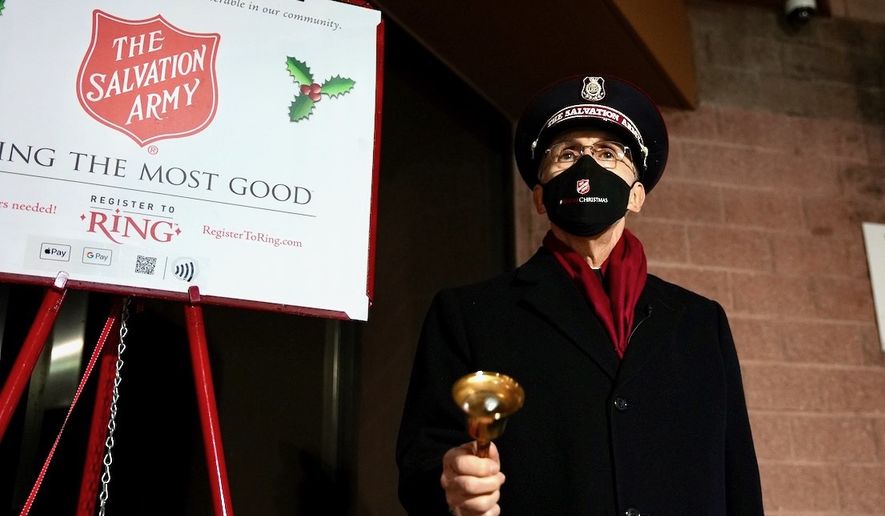The Salvation Army said Monday it has withdrawn a discussion guide on racism that was intended for its church members but that an advocacy group claimed was given to donors as a call to “repent” for being White.
“If that document is getting in the way of the fulfillment of our mission, The Salvation Army is going to remove it,” Commissioner Kenneth Hodder, the group’s U.S. national commander, told The Washington Times. “Because nothing can be allowed to affect the fulfillment of that critical mission.”
The church group has been flooded by email complaints about repentance requests over its guide “Let’s Talk About Racism,” one critic said. An online petition has garnered more than 14,000 signatures asking the organization to denounce critical race theory.
Commissioner Hodder said that funds needed to meet “an enormous increase in human need” are under threat from “unfounded” allegations.
“When The Salvation Army is subjected to sensationalist claims, such as have appeared recently, it causes confusion in the minds of many who would otherwise give,” he said in a telephone interview. “And that will have a direct effect upon our ability to meet all the needs that we anticipate meeting this year.”
Known for its 130-year-old Red Kettle Campaign, The Salvation Army hopes to raise $175 million this year on street corners, at shopping malls and outside of stores and supermarkets. In its 2020 fiscal year, the charity raised $557 million during the holiday season, or 23.5% of the $2.3 billion the public donated that year.
The contention began with the publication earlier this year of the discussion guide, which the evangelical Christian church created in response to protests against racial injustice in 2020.
Along with an extensive discussion of systemic and structural racism, the document included a conversation guide highlighting “the necessity of lament and repentance in the believer’s journey towards racial equity and racial reconciliation.” The Times obtained a copy of the document before it was taken offline.
“[A]s we engage in conversations about race and racism, we must keep in mind that sincere repentance and apologies are necessary if we want to move towards racial reconciliation. … Perhaps you don’t feel as if you personally have done anything wrong, but you can spend time repenting on behalf of the Church and asking for God to open hearts and minds to the issue of racism,” the document states.
Kenny Xu, president of Color Us United, which he described as a “small organization” dedicated to fighting critical race theory, organized the online petition calling on The Salvation Army to “revoke” the document and “denounce” CRT, which he claimed underlies the document. Mr. Xu said his group hopes to collect 25,000 signatures and are more than halfway there.
“The Salvation Army may have thought that CRT or their ‘Let’s Talk About Racism’ curriculum is innocuous, or consequenceless,” Mr. Xu said in an interview. “It is not. CRT is a parasitic ideology that will suck dry good-hearted efforts to solve the problems we have in America and put them into racial division instead.”
While acknowledging that “Let’s Talk About Racism” was not intended for donors, Mr. Xu asserted “it became very clear that they did not want this to leak out to donors, because if they let it leak out to donors, they would get very angry.”
Developed in graduate and law schools in the 1970s, critical race theory is an analytical tool based on Marxist critical studies. It posits that racism is a foundational element of American society and government and is important in understanding and evaluating U.S. laws, policies and programs.
How the Army responds to the dustup could determine how serious the consequences are long term, said A. Larry Ross, a Dallas-based public relations expert who was the chief spokesman for the late evangelist Billy Graham.
“I think the biggest threat to an organization’s reputation in a situation like this is not the crisis, but it’s how they choose to respond to that crisis that will determine the level of its impact. So that needs to be swift, it needs to be clear and direct,” said Mr. Ross, whose firm does not work for The Salvation Army.
Leslie Lenkowsky, an emeritus professor of public affairs and philanthropy at Indiana University, said the Army should be able to withstand the latest online attack.
“The fact that some of these things are swirling around on Twitter and the internet doesn’t necessarily mean that they’ll reach the kind of person who sees the kettle in front of a Target store, and gives loose change or a couple of bucks,” Mr. Lenkowsky said in a telephone interview. “People ultimately judge The Salvation Army, by what it does, which in this case, is to help needy people, rather than by study guides.”
Correction: An earlier version of this article misspelled Mr. Lenkowsky’s surname.
• Mark A. Kellner can be reached at mkellner@washingtontimes.com.




Please read our comment policy before commenting.